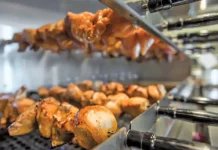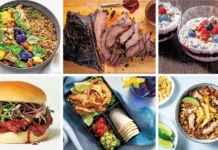
We are often focused on the stories that define Metro New York and the nation’s restaurant industry. The concept of Total Food Service was always to dig a little deeper to tell the stories of those who work outside of the restaurant industry as well. Once again we have uncovered one of those gems that beckons to be shared.
Randy Ruder has a story that is truly a “made in America” saga. While growing up on a farm in Wisconsin, a friend of his asked if he could help him wash dishes at a local restaurant. The rest, as they say, is history.
Over thirty years later, Randy Ruder developed a passion that has led to the General Management post of one of Metro New York’s most iconic clubs: Beach Point Club. Recently, he was initiated as Chairman of the club industry’s national association CMAA – Club Management Association of America.
Total Food Service visited with Randy Ruder in his office in between speaking engagements in New Zealand and a lobbying trip to Washington to chat about his career and vision for the club management industry.

Can you explain your background?
So I grew up on a family farm in Wisconsin and loved it. When I turned 16, a friend of mine asked what I was going to do today and asked if I wanted to go and wash dishes with him. That was Mother’s Day. And you know, I’ve always chuckled when we hire warriors for Mother’s Day. It’s like you can see who’s going to make it. Who will eventually become a manager someday.
I actually loved washing dishes. I did that for a few years and then they asked me to start prep cooking. I didn’t want to do it because I loved washing dishes, but it was more money. So I started cooking and then became a line cook. From there I knew I’d need to go to school to be a chef. But then something happened where they needed somebody in the front of the house. I was like ‘Wow, I love this, too!’ I was getting tipped and seeing more money.
So I decided to go to school for hospitality. I went to school and double majored in business administration and hospitality management. Throughout college, I worked at a bunch of different restaurants, managing people and the operations. I was convinced 100% that I was going to be a restaurant owner or manager. So when it came time to do an internship in my fourth year, I started looking at restaurants in France, but couldn’t find any, so I opted to go to New York City.
While in NYC, I stumbled across the Country Club of Troy in upstate New York and they had a three-month summer internship for the front of the house and I took it and was thrilled with the club industry.
They had so many things that I had never seen in Wisconsin and loved it all. The following year I did another internship at Elmwood Country Club and loved that experience as well. When it came time to graduate, I had my eye on a training program at Houston Restaurant Group, but I still felt a “club calling.”
While I was in New York, I learned about Eric Caspers, the longtime Manager of the Beach Point Club that had a great reputation. So on spring break right before graduation, I flew out to set up a meeting with Eric to talk to him about what I should do. Of course, it convinced me that I needed to do an internship there and he agreed to it.
So I went home back to Wisconsin and told everyone I was headed to NYC after graduation. But a week later, Eric called me and said he was sorry but he was not going to hire me. He didn’t want an intern. I was so disappointed and more embarrassed because I told everyone about my job.
So I asked him if he’ll let me come for the summer and that I’ll work for free if he was able to put me up somewhere to live. He agreed, so I went. He ended up paying me and I’ve been there ever since! I moved up in the ranks over the years and this will be my 27th season.
Is there a way to make a golf P&L work if it’s going to take six to eight hours to play 18 holes?
You need to keep that tradition up, but you need to find ways to make it family friendly and fun. Make it so that you can pop in and have a good time. I was at a golf club in Arizona recently and they have six golf courses with six clubhouses on their 2,000 acres and they continue to add.
The seventh and newest is a par 3 executive course with an all glass clubhouse and they’re just doing out of the box things. All the food that you’re going to order on the golf course comes to you from a drone. I love it! We also make our dining programs accessible and easy for families.
Tennis programs have been rumored to be struggling as well, but we’re very busy and it’s because we take a family-friendly approach to the program. We have a great team and great members.
How has the needs of members changed over the 27 years and what are they looking for?
Beach Point was founded by members of Quaker Ridge Golf Club, who were looking for a place for their wife and kids while they were golfing. When they went to golf, their families would hang out by the pool or by the beach and the guys would come back for a cookout after golf. So Beach Point was always family friendly and family focused as it was founded on families. So 20 years ago when clubs went through this evolution of becoming more family friendly, we were already there.
Many of our family members also belong to Quaker Ridge or to Old Oaks or to the other golf clubs, but they still retain their membership here. I think that in the last 20 years, there’s been this evolution that clubs need to be so much more than just golf or single focused.
Fitness and wellness have also become a highly sought after amenity in recent years. We addressed that need by adding a fitness center 10 years ago. The board was skeptical at first, but once it opened, the members loved it and it was an instant success. We’ve even added Peloton bikes. So every operation of the club needs to evolve and grow.
Do you look at restaurants in your community as competition?
Of course our members have many local dining options, but dining with us offers unique advantages; we always have a spot for you even if you don’t have a reservation, you have the table as long as you want and you can come in at any time. We often have price fixed meal nights. Saturday night dinner is one price for a multiple course meal that includes a grand dessert table.
So the value you’re getting can’t be beat! We also have a program I started about 10 years ago where we only mark all our wine up $5 over cost. So if you’re at a local restaurant, for example, and you buy a $30 wine, they might sell it for $90. We are selling that same bottle for $35. It’s great when members come and bring their wine friends and say “here, pick whatever you want.” Providing that value is a great thing.
I also think the food trends are important. Three years ago we really embraced the whole clean eating food trend and made sure that everything we have here is farm or local to table. The members like that and can taste the quality in the food.
What do you see for the future of the clubs?
I think clubs always need to be managed well and have a strong balance sheet. They need to practice fiscally responsible management. At Beach Point, we do a lot of capital improvements and the cash is either in the bank or it doesn’t get built. I’ve done about $20 million in renovations here, but we don’t go into debt.
You see some clubs that are $25 million in debt and then they’re trying to sell another $10 million-dollar renovation to try to make themselves more attractive. So they’ve financially strapped the club for the next several decades and in many cases there will be additional, more pressing projects to face.
What role does construction and revitalization of the physical property take in your role as general manager?
I think basic maintenance of the physical plant is very important. So whatever we have to do to make sure it’s clean and in good order, we make sure we’re on top of it to protect our investment.
Keeping everything state-of-the-art and current is also so important. I don’t like it when someone goes somewhere and they come back and start talking about what other clubs and restaurants have and we don’t. I like to have it first and I want to stay current with the trends. I think trade shows, education and going and seeing what’s out there is so critical.
So now that you’ve got a second job running a national organization, how do you do both?
Having a good team and being very organized. I always have lists of what I have to accomplish – both long-term and short-term goals. And I work hard. I don’t subscribe to a five-day workweek. I do try to have balance, though. But in my mind, I work seven days a week.
How do you go about building your management team?
So at the most basic level, my first year here, I wanted to build an internship program because the club didn’t have one. I wanted a true rotational program where they went through every department of the club. It’s become a very successful annual program. I mainly recruit from the University of Wisconsin/Stout because as an alum, I know the school, the teachers and the quality of work ethic that comes out of that institution.
How has the role of food and beverage changed in molding the next generation of leaders?
Our internship is heavily based in food and beverage because I believe that food and beverage management is the key to being a successful manager. Even if you are not a foodie or into culinary, young managers quickly realize that clubs revolve around food. Members are willing to pay more for quality and creativity on the plate. With that comes an opportunity to increase revenues.
I was in New Zealand two months ago and spoke about food and beverage in clubs. They are many years behind us and they either outsource their restaurants or offer a very limited menu. The whole point of the presentation is to show New Zealand managers what’s missing in their food & beverage programs.

Tell us a bit about your agenda for CMAA for the year and the impact you hope to make in the position?
CMAA has been a part of my whole career. I was a student member before I was a professional member. I’ve been involved in everything locally and nationally. I’m very excited to assume this role. We have a relatively new CEO and he’s built an amazing team. The role that I have is to support him.
One of my priorities is to start studying the career paths of students in our industry. We have so many great students coming through CMAA doing internships and getting into entry-level jobs, but then leaving the field after a few years. I think that CMAA and many established businesses are just not meeting the needs of these young workers.
I’ve been able to keep teams at Beach Point forever and I wonder why that’s not a priority at other operations. We created a task force to study why and help. I hope we can scratch the surface and figure out how to keep young people coming into this business because they’re the future. I want them to have the same excitement that I had.
I hope that the clubs in general continue to thrive and be healthy and continue to think outside of the box so that they aren’t just single focused. I hope that they’re incorporating fitness classes, adding new dining concepts or looking at other innovative programs to provide to their members. But they can’t be complacent – I can’t be complacent.























